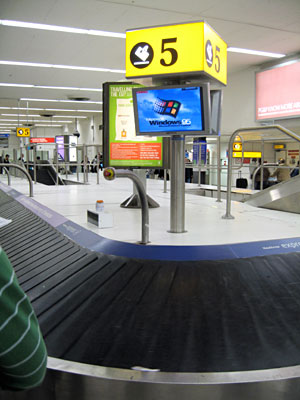Here’s a very nice one.
Possibly-related posts:
- Optical illusions Davina Bristow has a few nice optical illusions in this...
- It’s just an illusion Found this in the past, somewhere out there on the...
Here’s a very nice one.
A while back, I wrote about the danger of putting too much emphasis on what customers say they want. I’ve just come across this quote which is rather nice:
Nintendo has grasped two important notions that have eluded its competitors. The first is, Don’t listen to your customers. The hard-core gaming community is extremely vocal — they blog a lot — but if Nintendo kept listening to them, hard-core gamers would be the only audience it ever had. “[Wii] was unimaginable for them,” Iwata says. “And because it was unimaginable, they could not say that they wanted it. If you are simply listening to requests from the customer, you can satisfy their needs, but you can never surprise them. Sony and Microsoft make daily-necessity kinds of things. They have to listen to the needs of the customers and try to comply with their requests. That kind of approach has been deeply ingrained in their minds.”
[The emphasis is mine.] This is from a TIME magazine article which has disappeared behind a premium firewall, so thanks to Nick who posted it as a comment on Kathy Sierra’s site. Nick added:
Stick to satisfying expectations and they’ll end up being the limits you’re chained to!

When I was playing with in-car systems at the AT&T Labs, we always wanted to do maps which were coloured according to the time it took you to get to a certain location, or distorted to show time rather than distance. We never got around to it, sadly. Fortunately, Chris Lightfoot and Tom Steinberg did.
They have all sorts of nice variations on the theme, too. The fact that much of it is based around Cambridge makes it particularly interesting for me.
Imagine a collaborative project where everybody is feeding their road speed into a central database and you can get this sort of data in real time, centred on your location, wherever you are. That would be a fun project for somebody…
And has anybody done this for the airlines, I wonder?
Thanks to John for the link.
Mike Zornek has produced a very nice screencast which introduces you to version control in general, and the Subversion system in particular.
My brother sent me a birthday card recently with a picture of a spider on it. Inside he had written:
Little Miss Muffet,
Sat on a tuffet,
Eating her curds and whey;
Along came a spider,
Who sat down beside her
And said, “What’s a tuffet?”
If you thought the solving of Fermat’s Last Theorem was a great achievement for British science, then how about this?
Professor John Brookfield of the University of Nottingham has answered the question of Which came first, the chicken or the egg?.
Ever wondered why your bags take so long to come through the baggage claim at Heathrow? Well, now we know!

I took this a couple of days ago while waiting for mine. The screen proudly announced that this carousel came with Microsoft Internet Explorer. Well, that’s good to know.
Now come on, this must be a joke, surely? A high-frequency sound, audible only to teenagers, which keeps them away? It’s an attractive idea…
Presumably it’s audible to anybody younger than that as well, so if you’re wondering why your baby is crying in the supermarket, or why your dog seems particularly restless outside, here’s another possible reason!
Anyway, the teenagers are apparently getting their own back.
I think they’re probably both hoaxes…
Tim Berners-Lee warns of the dangers of a two-tier internet.
The telecoms companies don’t really have a leg to stand on here, I don’t think. I’ve heard them complain that companies like Google and Skype are making lots of money from customers on their networks, and they’re not getting a share of it. But they are, of course. The whole reason people want to buy their broadband services is that there are companies like Google and Skype out there.
And that’s not counting the fact that those companies are already paying for their bandwidth at the other end. A recent estimate put YouTube‘s connection costs at $1M/month. So if service provider X is concerned, for example, that they failed to win YouTube’s contract, but they’re handling lots of traffic to and from YouTube’s site, they should sort it out with the other service providers concerned, not simply try and aim at the people for whom they feel the most jealousy.
Hah! That’s nothing. See Giles Turnbull’s post on ‘Fast OS Switching’. “Until very recently, this sort of thing was just a daydream…”
I’ve also been doing some fun experiments with virtual machines.
What do you get if you take a 5-minute exposure of the space shuttle launch?
This.
© Copyright Quentin Stafford-Fraser
Recent Comments